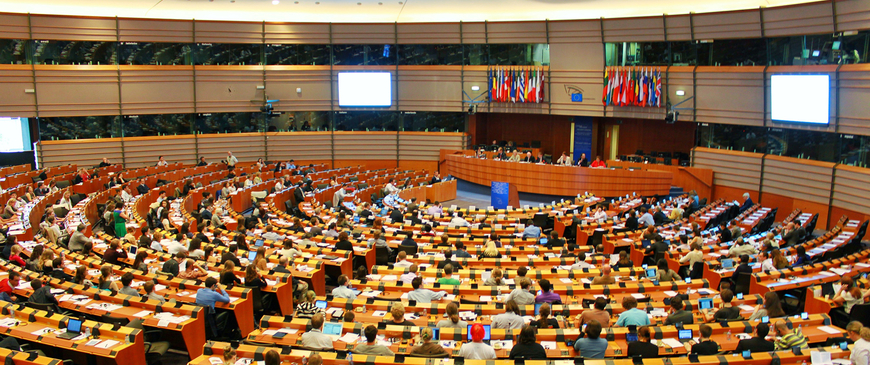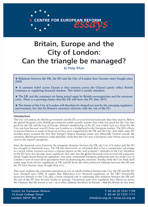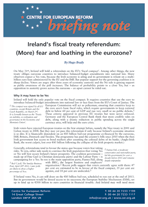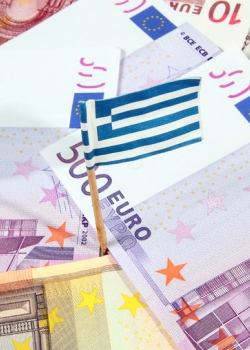Macroeconomics & the euro
Issue 85 - 2012
27 July 2012
- Europe needs a Rooseveltian break with fear, Hugo Brady
- A banking union – it is necessary, but is it likely?, Philip Whyte
- Is the Franco-British defence treaty in trouble?, Tomas Valasek
Britain, Europe and the City of London: Can the triangle be managed?
20 July 2012
The City of London's future will be shaped not just by a tougher regulatory environment, but also by uncertainties about Britain's relations with the EU.
Has the eurozone reached the limits of the politically possible?
12 July 2012
The limited measures agreed at June's summit are unlikely to take effect, suggesting that the eurozone has already reached the limits of the politically possible.
Needed: A Franco-German concordat
27 June 2012
The euro needs a Franco-German bargain: Germany must swallow eurobonds and a banking union, while France must let the EU have a say on its budget.
Germany's own goal: Why Berlin's sense of invulnerability will be its undoing
22 June 2012
Germany’s strategy for dealing with the euro crisis is maximising, not minimising, risks to the country’s economic and political interests.
Some sorts of austerity are better than others
01 June 2012
Governments in the eurozone's periphery are making indiscriminate cuts. Reducing spending that does little to support demand and recycling it into investment would help.
Issue 84 - 2012
25 May 2012
- A Greek exit will not be cathartic, Simon Tilford
- Time for France to take the lead on Syria, Edward Burke
- What Putin's return means for the former Soviet republics, Jana Kobzova, Tomas Valasek
A Greek exit will not be cathartic
25 May 2012
How the eurozone handles Greece will determine whether or not the single currency survives – and hence the future of the EU as a whole.
If a Greek exit from the eurozone is mishandled, contagion to the other struggling member-states could be uncontrollable, leading inexorably to the collapse of the euro....
If a Greek exit from the eurozone is mishandled, contagion to the other struggling member-states could be uncontrollable, leading inexorably to the collapse of the euro....
Ireland's fiscal treaty referendum: (More) fear and loathing in the eurozone?
11 May 2012
Ireland votes on the EU’s new fiscal compact on May 31st. Hugo Brady assesses the chances of a Yes and the consequences of a No.
Germany's choice: Higher inflation or sovereign defaults
09 May 2012
Germany faces a choice between higher inflation or a wave of sovereign defaults culminating in either a transfer union or the collapse of the eurozone.
Governance reforms have left the euro's flawed structure intact
18 April 2012
European leaders have presided over a major overhaul of the way the eurozone is run. But the eurozone's basic institutional configuration remains as unstable as ever.
Stable public finances require stronger business investment
26 March 2012
Economic recovery in Europe is being held back by the unprecedented weakness of business investment. Despite a secular decline in business taxation and labour market reforms that have boosted the power of capital relative to labour, the ratio of investment-to-GDP across the EU is at a 60 year low. Rather...
Issue 83 - 2012
23 March 2012
- How to keep Britain in the EU, Charles Grant
- Stable public finances require stronger business investment, Simon Tilford
- A new political bargain in Afghanistan, Edward Burke
Eurozone policy-makers place a big bet
13 March 2012
The ECB's decision to lend almost unlimited amounts of money to Europe's banks has bought the eurozone some time. But there is risk that time will be wasted.
Europe's growth strategy: All supply and no demand
27 February 2012
Europe's growth performance since 2008 has been abject. The reason is that fiscal policy has done too little to offset the impact of deleveraging in the private sector.
France: Why the self-flagellation?
10 February 2012
France has its economic weaknesses. But in some important respects its model holds out better prospects for a return to economic growth across the eurozone than does Germany's.
Greece's real challenge
03 February 2012
Greece's new bail-out package needs less austerity and more structural reforms. A bloated and immobile public sector remains a drag on growth.
Issue 82 - 2012
27 January 2012
- Needed: A growth strategy for Europe, Simon Tilford
- Why an EU financial transactions tax is a red herring, Philip Whyte
- The US declares peace in Europe, prematurely, Tomas Valasek
The Baltic states and Ireland are not a model for Italy and Spain
27 January 2012
Were Italy and Spain to emulate the Baltics states and Ireland, the implications for the European economy and the future of the euro would be devastating.
Why an EU financial transactions tax is a red herring
26 January 2012
Ever since it was first mooted in the 1970s, a financial transactions tax (FTT) has often been thought of as an interesting idea that cannot work in practice (because it needs to be adopted universally if it is not to be undermined by tax arbitrage). In other words, the difficulty...



























